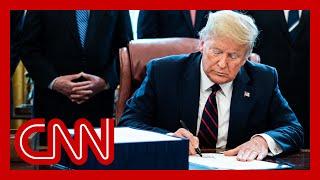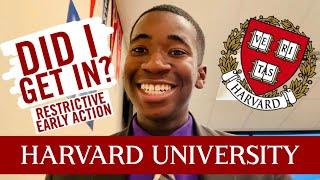Elite College Endowments: Trump tells Harvard to return stimulus money
Description
Elite College Endowments: Trump tells Harvard to return stimulus money
One day after President Trump criticized them, Harvard University announced that they would not be accepting the $8.6 million in taxpayer money that the university was set to receive as part of an emergency relief package for higher education.
Other elite universities, such as Princeton, Stanford and Yale also announced that they would not be taking the money designated to them through a $14 billion federal aid package for higher education.
The money was part of a $2 trillion relief package that President Trump signed into law on March 27th.
This criticism centred around the endowment size of the elite US universities.
Harvard has an Endowment of $40.9 billion, the largest in the world.
In 2019, the endowment distributed $1.9 billion to the university, representing 35% of Harvard's total operating revenue.
The largest allocation was to hedge funds, which returned 5.5%
Followed by public equity, which returned 5.9%
Followed by private equity, which returned 16%
Yale, thanks to David Swensen, has an Endowment of $30.3 billion.
In 2019, the endowment distributed $1.4 billion to Yale, 33% of Yale's total operating revenue.
In terms of asset allocation, Yale is currently targeting a 30% allocation of the endowment to market-insensitive assets (cash, bonds, and absolute return).
It also seeks to target a 53% allocation to illiquid assets such as venture capital, leveraged buyouts, real estate, and natural resources.
Stanford has an Endowment of $27.7 billion
In 2019, the endowment distributed $1.3 billion to the university, representing 22% of Stanford's total operating revenue.
In terms of asset allocation, it is mainly Private Equity, Absolute Return and International Equity.
By the way, Absolute Return just refers to value-driven and event-driven hedging strategies such as long/short equity, distressed investment and special situation investment. They are designed to have lower volatility over time.
Princeton has an Endowment of $26.1 billion
In 2019, the endowment distributed $1.4 billion to the university, a massive 64% of Yale's total operating revenue.
In terms of asset allocation, it is mainly Private Equity, Real Assets and Independent Return.
Private Equity refers to investments in private companies, ranging from startups all the way up to leveraged buyouts.
Real Assets refers to real estate and natural resources, and Independent Return refers to hedge funds or, in superior Ivy League speak, investment vehicles that seek high absolute returns that are typically independent of broad market trends.
According to Henry Hansmann, Professor Emeritus of Law at Yale Law School, "a stranger from Mars who looks at private universities would probably say they are institutions whose business is to run large pools of investment assets and that they run educational institutions on the side that can expand and contract to act as buffers for investment pools."
As well as this, many top US universities were implicated in the Paradise Papers for using offshore funds to grow their endowments.
104 US universities and colleges were named in data from the law firm Appleby, with four of the top 10 schools by endowment named in the files: Columbia, Princeton, Stanford and the University of Pennsylvania.
Most contentiously, some of the offshore funds invested in carbon-polluting industries, despite leading US universities playing a key role in the fight against climate change.
Now back to Harvard...
With such a massive endowment, some have claimed that the school should use more of the fund to entirely eliminate tuition.
Others have argued that Harvard’s funds could be better used by recruiting and educating more low-income students, rather than giving free education to their already relatively well-off student body.
Harvard clapped back. In their 2018-2019 financial report, they stressed that the endowment does not give the school full financial freedom.
"There is a common misconception that endowments, including Harvard's, can be accessed like bank accounts, used for anything at any time as long as funds are available. In reality, Harvard's flexibility in spending from the endowment is limited by the fact that it is designed to last forever, which is crucial for an institution intended to serve generations of students and pursue research on big questions - questions that cannot be answered in one lifetime."
What are your thoughts on the endowment situation: Are they just asset management firms with schools attached?
FOR MORE COMPOUNDED VALUABLE CONTENT, SUBSCRIBE AND LIKE
PATREON:
https://www.patreon.com/user?u=31852839
BTC Donation Address





















Comments